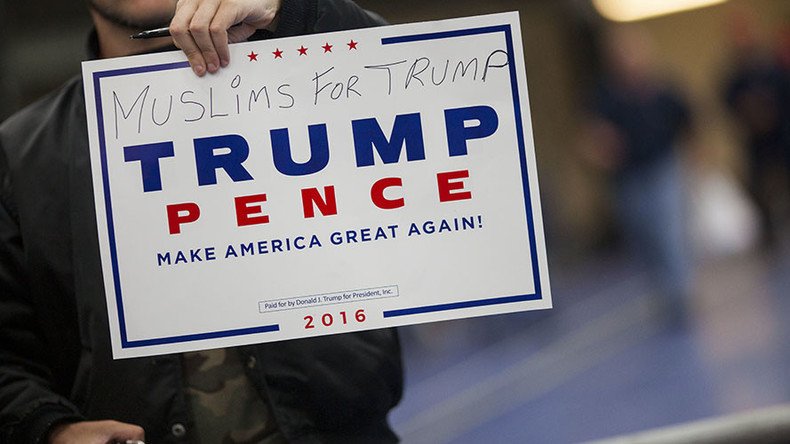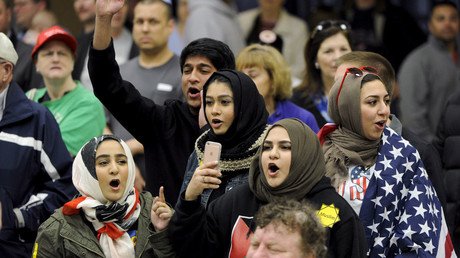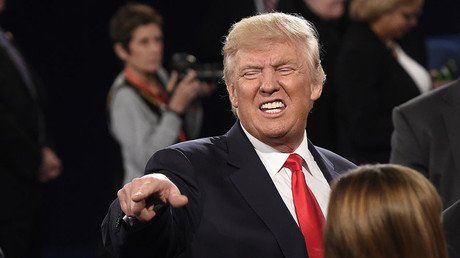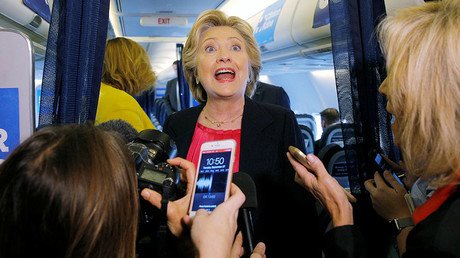‘P***y-grab’ comments don’t represent ‘real’ Trump - Founder of Muslim Republican Coalition

The anti-Trump camp may be surprised that the Republican candidate’s controversial remarks about Muslims and women have garnered him renewed support with someone who’s both Muslim and female: the founder of the Muslim Republican Coalition, Saba Ahmed.
It had pretty much become general consensus in the media that the leaked tape of Donald Trump talking about the sexual perks that come with being famous would all but decimate support for him on both sides of the gender divide. And, to an extent, it has. Former Republican candidate, Senator John McCain and other Republican heavyweights have emerged with heavy criticism of Trump’s comments. Coupled with his earlier remarks calling for a ban on Muslims that come to the US, one might think this would be enough to ruin his chances against Democrat rival Hillary Clinton.
But words of support have come from an unexpected source.
The woman behind the Republican Muslim Coalition, Saba Ahmed, spoke to Al Jazeera on Monday to voice her personal support for Trump – three days after the “locker-room talk” tape was played to the world.
Ahmed’s reasoning is that, yes, the “grab her by the pussy” comment Trump made was “very offensive to women.” But those remarks “do not represent who he is” as a person. Ahmed also believes the need for a Republican in the White House is great enough to overlook public displays.
Ahmed believes the second presidential debate showed a “strong” Trump, who tackled some important issues, and did so in an excellent manner. She particularly liked his views on the current state of the economy.
The leader of the Muslim Republican Coalition, remarkably, is a former Democrat. This is a party she had left in 2011 after becoming disillusioned with what she considered were the party’s “incompatibility with Islam” owing to its “liberal values,” as she outlined in a February interview.
What is perhaps even more remarkable about her latest interview is that she struck out at Trump’s views on Islam, but also listed them as the main reason behind the creation of the Coalition – “to educate them about our faith.”
“I hope to see GOP presidential candidates change their views if they are serious about winning back the White House,” she had hoped at the time. As she reached out to other notable Republicans Ted Cruz and Marco Rubio – both of whom recently lost the party’s presidential nomination to Trump – she explained:
“They all are interested in Muslim American voters, but have reservations about reaching out to mosques. We hope to have the Republican Muslim Coalition become a resource for them. They are being advised by people who hate Muslims and Islam ....”
There has been a growing divide in the United States between Muslims and the Republicans. After 9/11, the lion’s share of Muslims started voting Democrat. By 2015, the number of Muslims identifying with the party grew to 70 percent, according to a Pew Research Center poll.
Ahmed has been trying to bring the Muslims and Republicans back together through her work – something which also earned her Republican ire, especially from Ted Cruz, whose idea to patrol “Muslim neighborhoods” she found “absolutely horrifying” – remarks that were both delivered in March, following the deadly terrorist attacks that rocked Brussels.
“I’m not sure which neighborhoods he’s talking about when he talks about surveilling Muslim-Americans,” Ahmed had told the Fox Business Network at the time. “I’m really disappointed in a lot of the GOP presidential candidates.
“They’re being advised by Islamophobic people,” Ahmed continued. “Why are they not talking to any Muslims about Islam?”
However, when it became clear Trump was becoming a more prominent force, Ahmed tried to rally people behind him.
Other prominent Muslim figures recently interviewed by Al Jazeera shared Ahmed’s conviction. Taking the argument further, Roy Hanania, a Chicago-based Palestinian-American journalist, was upbeat about a Trump presidency.
“For us, Arabs and Muslims, the real objective for us is change, and Trump represents a better chance for our community to introduce real change in the policies of the US government especially in the Middle East,” he said.
Perhaps most striking here is that Hanania is a Democrat. When asked what he saw as the main difference between Clinton and Trump, he said Hillary was no better when it came to offending women.
“Trump said lewd things about women, but Bill Clinton actually did bad things to women and Hillary defended him for it,” Hanania said, echoing Trump’s rhetoric from the second presidential debate.
While the topic of engagement with Islam and Muslims is a very prominent one in the United States, they represent only 1 percent of the US population, so have not so far been a demographic the US candidates normally catered to in their campaigns.















